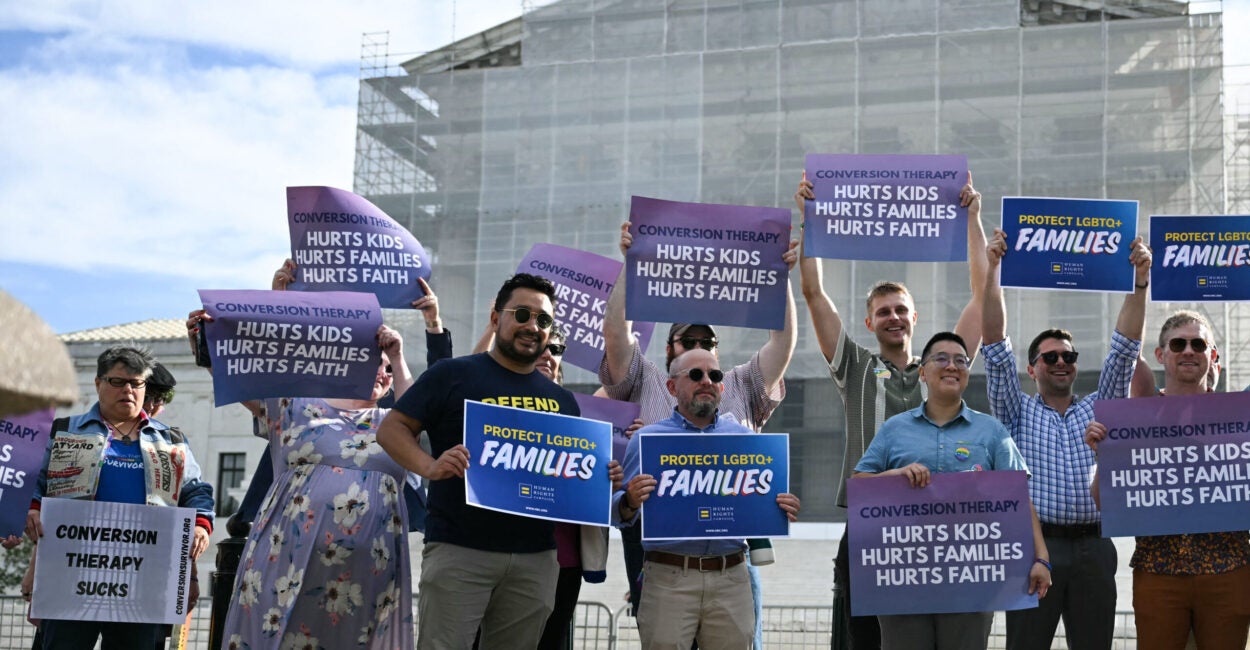


On just its second day of the 2025-26 term, the Supreme Court heard arguments in one of its most important cases.
Chiles v. Salazar involves a challenge to a Colorado law that allows licensed counselors to address issues of sexuality and gender only from the state’s approved ideological perspective. The Supreme Court’s decision will have a significant impact on First Amendment freedoms and whether young people may seek help that they need.
Kaley Chiles is a Christian licensed counselor in Colorado Springs who employs solely what is often called “talk therapy” with those who voluntarily seek her help and who define their own goals. Her clients include minors struggling with issues related to sexuality and gender who want to better align their attractions and behavior with their sex and their religious faith.
A Colorado law prohibits licensed counselors from “any practice of treatment…that attempts or purports to change an individual’s sexual orientation or gender identity, including efforts to change behaviors or gender expressions or to eliminate or reduce sexual or romantic attraction or feelings toward individuals of the same sex.”
That law does not apply to “practices or treatments that provide acceptance, support, and understanding for the facilitation of an individual’s coping, social support, and identity exploration and development.”
Mental health professionals who violate this law may face disciplinary action—so in 2022, Chiles filed a lawsuit arguing that it violates the First Amendment’s protection for free speech. Specifically, because it allows counselors to address sexuality and gender in one way but not another, she argued the law amounts to unconstitutional viewpoint discrimination.
A federal district court and a U.S. appeals court denied Chiles’ request for a preliminary injunction while her case was being litigated.
The argument before the Supreme Court raised several key issues.
The first was whether Chiles had legal “standing” to challenge the Colorado statute. Colorado said no because the statute does not apply to her counseling work—meaning she need not fear disciplinary action. But that’s not how Colorado described its statute in the lower courts—and it’s inconsistent even with the text of the law itself.
Justices Neil Gorsuch and Amy Coney Barrett appeared to dismiss what they called Colorado’s “late breaking standing argument,” and Alliance Defending Freedom attorney James Campbell reminded the court that Colorado was even then investigating complaints claiming that Chiles had violated the statute.
While for standing purposes, Colorado claimed Chiles did not violate the statute, it said the opposite for purposes of defending the statute itself. Talk therapy, argued Colorado Solicitor General Shannon Stevenson, constitutes “medical treatment,” giving the state wide authority to regulate it—as much as it has over medication or even surgery. Stevenson suggested that talk therapy is no different than shock therapy or other extreme, and long abandoned, practices.
Another issue is the legal standard the Supreme Court should apply in this case.
The conclusion may depend on whether the Court treats Chiles’ work as speech or conduct. Campbell cited numerous First Amendment precedents holding that restrictions on pure speech must meet a high legal standard called “strict scrutiny,” which requires that a government action be the “least restrictive means” of furthering a “compelling” purpose. Colorado’s law, Campbell argued, does not come close to meeting this high standard.
The Trump administration, which entered the case supporting Chiles’ position, also filed a brief, and Deputy Solicitor General Hashim Mooppan participated in the oral argument. He too emphasized the difference between conduct and speech and, in responding to a question from Justice Clarence Thomas, repeated that the record contains no evidence of harm from the talk therapy that Chiles employs.
Another important issue is how the Supreme Court should handle this case—even if it agrees with Chiles that strict scrutiny applies. Liberal justices Sonia Sotomayor and Ketanji Brown Jackson pushed for simply sending the case back to the lower court to apply that standard. Both Campbell and Mooppan, however, argued that would be an empty gesture and a waste of time, since Colorado had already conceded it had no evidence of harm from the talk therapy that Chiles actually employs with her clients.
Despite winning in the lower courts, Colorado’s argument is hard to sustain. Chiles seeks to provide what the statute forbids, and the distinction between conduct and speech is clear both in the Supreme Court’s First Amendment cases and in the context of this case. This means there’s a good chance that a majority of justices will hold both that Chiles has standing and that, since it restricts pure speech, the law must meet the strict scrutiny standard.
The only remaining question would be whether the Supreme Court would apply strict scrutiny itself, or whether it would instruct a lower court to do so. At least based on the argument, that’s a closer call.
In his closing comments, Campbell presented this jarring summary of Colorado’s law: A 12-year-old may, without his parents’ knowledge, seek a counselor’s assistance to acquire a female identity, but a 12-year-old may not, even with his parent’s consent, seek such assistance to align his identity and sex. As he put it, the First Amendment cannot allow that.
Related posts:
- LGBTQ Groups Ask Court to Uphold Conversion Therapy Ban
- News of Religious Freedom’s Demise Might Be Exaggerated After All
- US Supreme Court Looks to Start Consequential New Term
